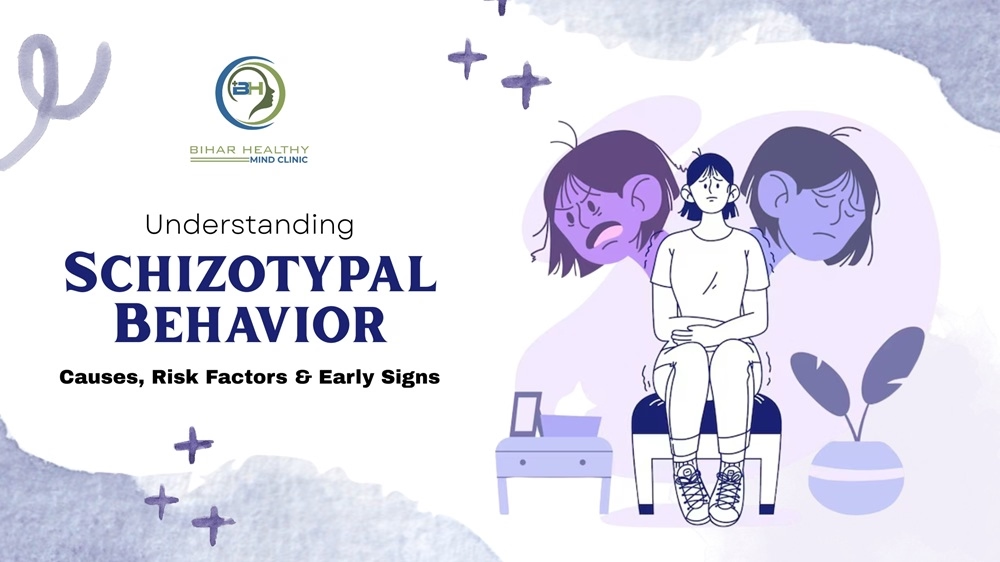
Personality disorders involve enduring patterns in thinking, emotional response, and behavior that deviate notably from cultural norms. Among these, schizotypal personality disorder (STPD) is one of the more complex conditions, known for its eccentric thinking, unusual behavior, and social difficulties. At Patna Psychiatry, under the care of Dr. Saurabh Kumar, MD (Psychiatry), widely regarded as the Best Psychiatrist in Patna, individuals with schizotypal tendencies receive effective, compassionate, and science-backed treatment.
Let’s take a closer look at how schizotypal personality disorder develops and why early intervention is important.
What is Schizotypal Personality Disorder?
Schizotypal personality disorder falls under Cluster A, a group characterized by unusual or eccentric behavior patterns. People with schizotypal traits may experience distorted thinking, display unusual behaviors, and struggle to form close relationships. It is distinct from schizophrenia, although it shares some similarities such as social anxiety, suspiciousness, and magical thinking.
How Does Schizotypal Personality Disorder Develop?
A mix of genetic predisposition, brain function differences, and environmental influences contributes to the onset of schizotypal personality disorder. Understanding these elements can help in early recognition and effective treatment.
Genetic Predisposition
There is strong evidence suggesting that schizotypal traits run in families, particularly among those with a history of schizophrenia or other psychotic disorders. Having a first-degree relative with schizophrenia may increase the likelihood of developing schizotypal tendencies.
-
Brain Structure and Function
Neuroimaging studies have found structural differences in the brains of individuals with schizotypal disorder. These include irregularities in the temporal and frontal lobes, which are responsible for emotional regulation, memory, and social cognition. Neurochemical imbalances, particularly involving dopamine, may also contribute to the disorder’s onset.
-
Early Childhood Trauma and Environment
People who experienced emotional neglect, abuse, or isolation during childhood are more prone to developing schizotypal features. An unstable or unpredictable family environment may hinder emotional development and increase the likelihood of maladaptive coping mechanisms.
-
Psychological and Cognitive Factors
Certain thinking patterns, such as a persistent belief in magical thinking or superstitions, might start early in adolescence. Individuals may struggle with abstract thinking, have odd speech patterns, or misinterpret normal social cues, signs that often become more evident in the late teen years or early adulthood.
Initial Indicators and Common Symptoms of Schizotypal Personality Disorder
Spotting early symptoms can play a critical role in seeking timely psychiatric help.
-
Some common signs include:
- Ongoing discomfort in social settings and challenges in building close relationships
- Eccentric behavior and unusual dress or mannerisms
- Paranoid thinking or suspiciousness
- Unusual beliefs or a tendency toward magical thinking, such as the belief in telepathic abilities
- Inappropriate emotional responses
- Unusual speech patterns or vague conversation
- Preference for social isolation
If such behaviors persist and cause distress or functional impairment, a psychiatric evaluation is recommended.
When to Seek Help
STPD often goes undiagnosed until the symptoms interfere with personal, professional, or social functioning. At Patna Psychiatry, patients are encouraged to seek support at the earliest sign of emotional or behavioral difficulty. Early treatment can prevent the condition from worsening or leading to secondary issues like depression or substance abuse.
Treatment Approaches at Patna Psychiatry
While schizotypal personality disorder cannot be “cured” in the traditional sense, with proper support, many individuals learn to manage their symptoms effectively. Under the expertise of Dr. Saurabh Kumar, widely regarded as the Best Psychiatrist in Patna, treatment is personalized, evidence-based, and compassionate.
- Psychotherapy - Cognitive Behavioral Therapy (CBT) is commonly employed to challenge irrational thoughts and enhance interpersonal skills. Long-term therapy can help individuals learn to recognize and modify unhelpful patterns of thinking.
- Medication - Although no specific drug is approved solely for schizotypal disorder, medications such as antipsychotics, antidepressants, or anti-anxiety drugs may be prescribed depending on the symptoms and coexisting conditions.
- Social Skills Training - Supportive interventions that help individuals develop interpersonal communication and problem-solving abilities are particularly beneficial.
Why Choose Patna Psychiatry?
Patna Psychiatry is a trusted center for mental wellness, offering cutting-edge psychiatric care tailored to individual needs. With a calm therapeutic environment and the guidance of Dr. Saurabh Kumar, patients with schizotypal traits receive the highest standard of care in Patna and Bihar.
Final Thoughts
Schizotypal personality disorder may develop silently over time, making it crucial to understand its warning signs and underlying causes. With timely diagnosis and expert intervention, individuals can lead fulfilling lives despite the challenges of this complex condition.
If you or a loved one is struggling with symptoms that resemble schizotypal traits, Patna Psychiatry offers a safe space to explore your concerns and begin the journey toward recovery with one of the Best Psychiatrists in Patna.
Visitors: 180





No comments yet.